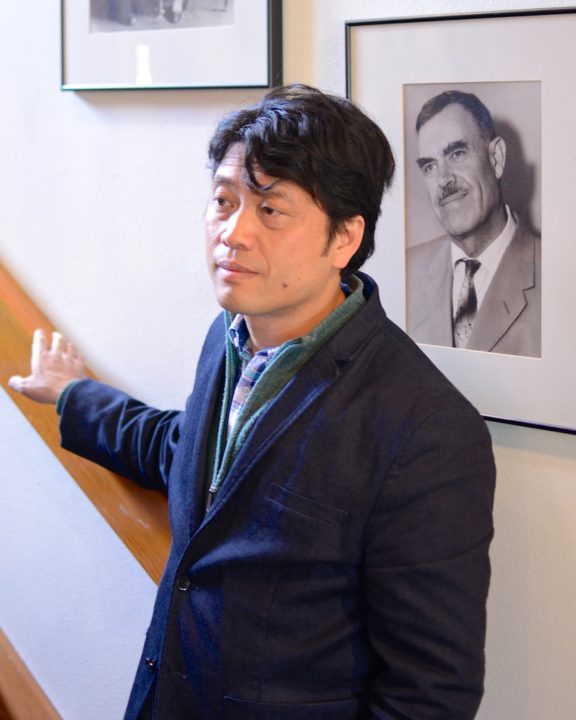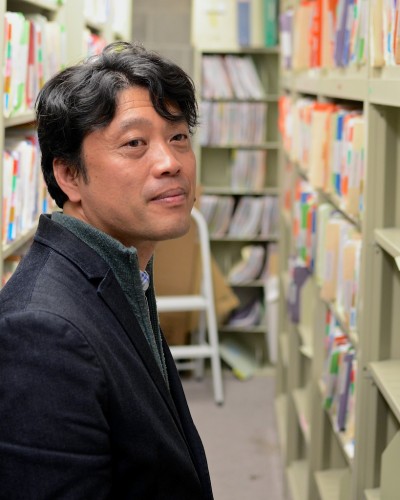
“I recognize this picture,” Jung Henin says, pointing at the picture of Bertha Holt in a flowy, pink dress surrounded by children on the back cover of her own book, “Seed from the East.”
“It was at Ilsan when I was there,” he says, “but very big. It is making me remember.”
Last week, Jung, a graphic artist turned film director, was in Eugene, Oregon to screen his new film “Approved for Adoption” — an illustrated memoir about his experience growing up in Belgium in the 70s as a Korean adoptee — at the Cinema Pacific Film Festival. His film is raking in awards internationally, from film festivals in Italy to Armenia and beyond — proof that the subject and message of the film extend far beyond audiences touched by adoption.
“It’s not a film about adoption only,” Jung says, as he sits in a yellow armchair at Holt’s headquarters. “I’m adopted, so I tell that story, but the different thematics — identity, uprooting — it’s universal. It’s a story about relationships.”
Jung’s film, equal parts beautiful in its cinematography and storytelling, uncovers Jung’s childhood both before and after he was adopted at 5 years old. We watch Jung’s struggle to find his place among a family of white faces and blonde hair, to feel loved by his strict mother, and overcome a constant feeling of otherness. Jung’s memoir chronicles his quest for identity and acceptance — both of accepting himself and of accepting his past — and his eventual return to Korea at the age of 44. Both heartbreaking and inspirational, “Approved for Adoption” mixes video footage from Jung’s childhood, live shots as he explores Korea as an adult, and animated illustrations, which gives the film a dream-like feel — skewing the lines between reality and fantasy. Slowly, the illustrations begin to feel real and the live footage feels more like make believe. Jung‘s primary goal, he explains, is to show the transformation all adoptees must go through to recreate themselves, which comes easier to some more than others.
“I’m interested in the reconstruction and the resiliency,” Jung says about the themes in his film. “As an adoptee, there is a time when you have to accept the trauma. You have to rebuild.”
In his first trip to the United States to screen “Approved for Adoption,” Jung just happened to end up in Eugene, where the history of adoption began. Here, Holt’s founders, Harry and Bertha Holt, pioneered international adoptionin the wake of the Korean War. Although Jung’s trip to Eugene was for the film festival, he is very aware of Holt’s role in the history of adoption — and even wove imagery of Holt’s beginnings into his film. Jung’s film, an adaptation of his graphic novel, shows live scenes of Eugene natives Harry and Bertha and the start of Holt International in Korea.

The day before the Cinema Pacific Festival, Susan Cox, Holt’s vice president of policy and external affairs, leads Jung on a Holt office tour — stopping to point out the many black and white photos from Korea hanging on the walls. For 10 months in 1971, a 5-year-old Jung lived at Holt’s Ilsan Center — a care center for orphaned and and abandoned children in Korea — before traveling to Belgium to join his family. As he studies the photos and the walls of adoption files in the vault, he seems to be searching for a piece of himself. And, as he picks up Bertha Holt’s book about the history of Holt, a memory he hadn’t pulled into his consciousness in years is suddenly clear. The photo of Bertha on the back cover, he recalls, hung inside the walls of Ilsan.
“Approved for Adoption” is a poignant film, and one that Jung says has been surprisingly helpful to adoptive families.
“I get letters all the time,” Jung says. “People who have watched my film, and say now they understand what their adopted son or daughter feels.”
This month, Jung will return to Korea to screen his film and conduct research for his upcoming live-action film about modern child abandonment issues in Korea. Jung hopes to translate the graphic novel from French to English this year.
“Approved for Adoption” can be purchased or rented here. The film may not be appropriate for younger audiences.

